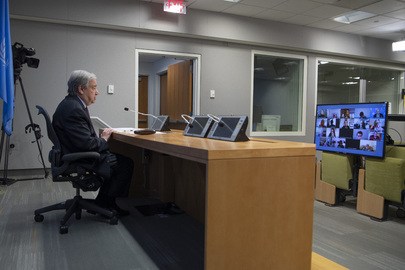UN Secretary-General António Guterres paid tribute to all journalists working under difficult conditions during the coronavirus crisis at an online dialogue on Press Freedom and Tackling Disinformation.
The event was organised yesterday (4 May) with the support of members of the Group of Friends of the Safety of Journalists at UNESCO and brought together UNESCO Director-General, Audrey Azoulay, and UN High Commissioner for Human Rights, Michelle Bachelet. Investigative journalists and heads of state and government participated also in the event.
“I have spent time in war zones and refugee camps," the UN Secretary-General said. "I have seen how journalists risk their lives to make sure people’s stories are heard. I could not do my job without the courageous, creative and often deeply moving work of the media."
“Reporters regularly bring to light major cases of corruption and nepotism, human rights violations, ethnic cleansing, sexual and gender-based violence. These reports are crucial in the pursuit of justice, laying the foundations for more detailed investigations that may lead to prosecutions.”
But the media has come under increasing pressure in recent years. Many journalists face threats, harassment and violent attacks. Last year, 57 journalists were killed around the world.
When journalists are attacked, societies as a whole pay a price, he said. No democracy can function without press freedom, which is the cornerstone of trust between people and their institutions.
“This year on World Press Freedom Day, the world, including the media, faces an entirely new challenge: COVID-19, which is affecting everyone, everywhere. Along with the pandemic, we are seeing a dangerous outbreak of misinformation, from harmful health advice and hate speech to wild conspiracy theories,” Guterres said.
“Blatant lies spread online at a terrifying rate. A recent analysis found that more than 40 percent of posts about COVID-19 on one major social media platform were posted by bots – automated programmes disguised as people.”
Reporting can save lives
Guterres underlined that journalists and media workers of all kinds are crucial to helping us make informed decisions. “In a pandemic, those decisions can save lives. Now more than ever, we need the media to document what is happening; to differentiate between fact and fiction; and hold leaders accountable.”
Echoing the European Commission’s position on states of emergency during the crisis, he said,“While temporary constraints on freedom of movement are essential to beating COVID-19, they must never be used as a pretext for cracking down on journalists’ ability to do their work.”
“People are scared. They want to know what to do and where to turn for advice. They need science, and solidarity. So I thank the journalists and others who are reporting and fact-checking stories and social media posts, particularly those women and men covering public health. The United Nations stands with you.”
Guterres also welcomed recent commitments by social platforms to amplify factual content and combat disinformation -- particularly those that are proactively removing harmful material. “I urge them to build on these efforts which are helping to prevent the spread of dangerous rumours and fake cures.”
International organisations and governments have an important role in promoting facts and scientific approaches.
“But no one can take the place of the media during this pandemic in providing the public with information and analysis, and in countering rumours and distortions,” he said and urged governments and leaders of all kinds to do everything in their power to protect journalists and media workers, and to strengthen press freedom.
Asked if media could cooperate with governments during the crisis without compromising their independence, the UN Secretary-General replied that it was possible provided that they did not become instruments of the government. “Their only commitment is to truth and they must preserve their independence at all cost.”
M. Apelblat
The Brussels Times

